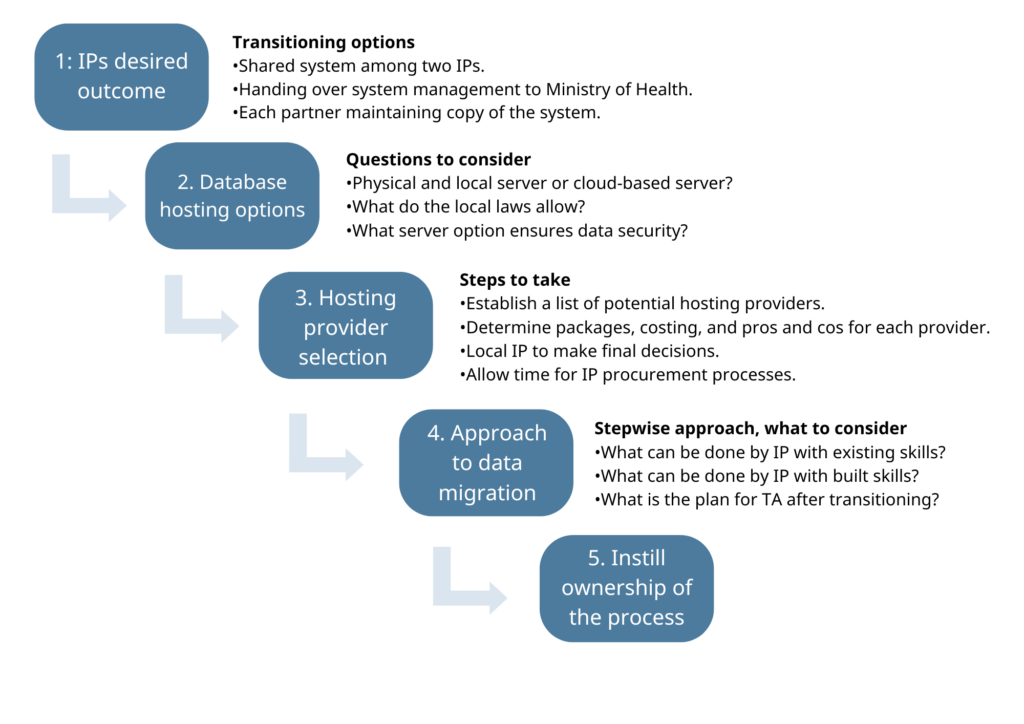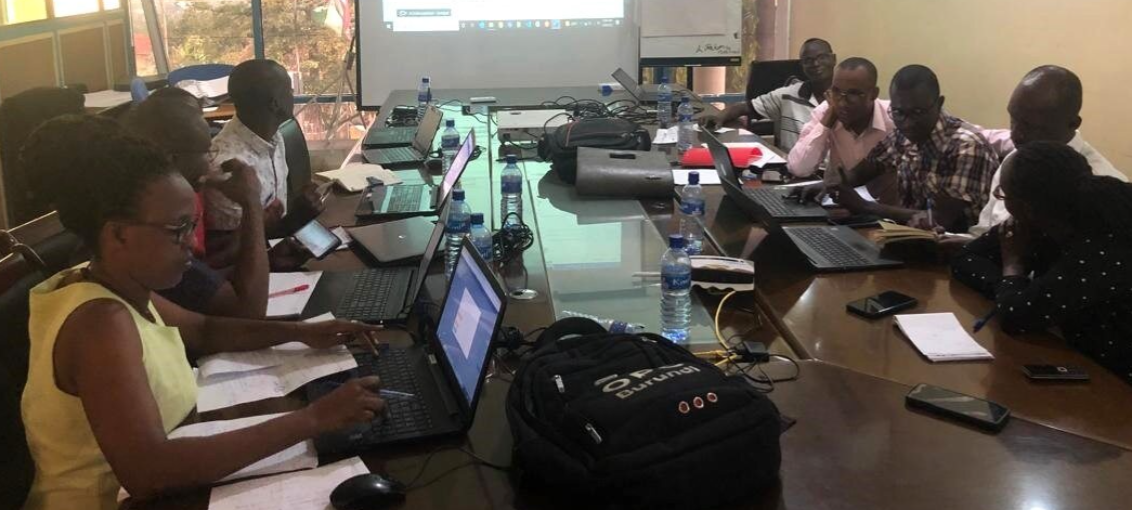Dismas Gashobotse, Project Director and FHI 360 Country Representative, EpiC Burundi
Gloriose Kamariza, Senior Monitoring & Evaluation Officer, EpiC Burundi
Antony Sibanda, Application Analyst–DHIS2 Specialist, FHI 360
Dorica Boyee, Technical Advisor, Strategic Information, EpiC
Yannick Willy Nitunga, Program Technical Director, SWAA Burundi
Dorian Gakiza, Program Technical Director, ANSS Santé Plus Burundi
Locally led development is the new standard. The Meeting Targets and Maintaining Epidemic Control (EpiC) project strives to achieve that standard throughout its work in multiple countries. One way to increase local ownership is to transition data systems for strategic information (SI) to country-based partners, a process that requires an organized, systematic, and thoughtful approach.
In Burundi, USG tasked the EpiC project with transitioning the SI system and processes to local implementing partners (IPs). The system included a DHIS2 database that was originally managed by EpiC Burundi and is now owned and managed by two Burundian IPs: Society for Women Against AIDS in Africa (SWAA Burundi) and Association nationale de soutien aux seropositifs et aux malades du sida – Santé Plus (ANSS – Santé Plus). This transition process took about 18 months.
Below, we share key considerations for decision-making when transitioning a database based on the DHIS2 platform.

Agree on desired outcomes
As the technical assistance (TA) provider, the EpiC team worked with both SWAA and ANSS–Santé Plus to define the desired outcomes. The options considered included shared management between the partners; handing over the system to the Ministry of Health (MOH); or having each organization maintain a separate system. Sustainability of the system, security and confidentiality of the populations being tracked were identified as priorities. With those two priorities, EpiC worked with each partner to determine needs. Ultimately, both organizations decided to manage their own systems to better address the specificity and confidentiality needs.
This system will allow … all organizations — SWAA and ANSS–Santé Plus to have their own data entry and analysis platform which did not previously exist, and the system will be managed by each of the organizations considering the specificity of the target groups and the confidentiality of the data, as well as the security of the populations served.
Yannick Nitunga, Technical Program Director from SWAA Urisanze’s activity.
Choose a hosting solution
The choice between a local or cloud-based server considered local laws, server capacity, and infrastructure. In Burundi, there are no restrictions on cloud storage, but local servers have limitations. Both SWAA and ANSS–Santé Plus had existing local servers used by other systems, however their limited capacity could not sufficiently accommodate this database. Ultimately, the deciding factor was data security.
A cloud-based data system is better to our program for the following reasons — data security for the populations served because in our country there are laws criminalizing key populations and with the use of a local server intrusions into this database are possible in event of police searches.
Yannick Nitunga, Technical Program Director from SWAA Urisanze’s activity.
Identifying cloud-based hosting provider
Selecting a hosting provider required evaluating their capacity and compatibility with the organizations’ needs. Rather than simply informing SWAA and ANSS–Santé Plus of the requirements for hosting, the EpiC team collaboratively identified and discussed the organizations’ capacity for data system management, including the human resource needs. It was beneficial for EpiC and the IPs to meet with a few potential hosting providers for informed decision-making of the provider meeting each IP capacity and needs. For SWAA and ANSS–Santé Plus, the choice of the hosting provider was determined by the cost of their packages, ability to work in French, experience working in Burundi, and a local presence for quick assistance.
Data migration and data management
Data migration was approached in stages. First, migrating essential metadata and data for ongoing data use and reporting. Second, identify elements of the data system that could be migrated at a later stage or built into the local system by the organizations’ staff. Third, once the data have been migrated, there is a need to build capacity on data visualization tools such as PowerBI. In Burundi, the EpiC team learned the importance of an additional TA period to support skills-building in system management after data migration. Soliciting feedback from the IPs on their use and system management experience post transitioning is recommended to help plan the TA needed in the post-migration period.
Ownership and management
Ownership of the data and data system is vital for success. To promote ownership, share as much information as possible, while supporting the organization to meet their goals. The organization should lead decision-making for meeting frequency, who to involve in different stages of the process, and options for short-term and long-term solutions. The more feedback solicited from the organization on the process not only improves TA provision but also helps instill a sense of ownership.
Transitioning data systems to local ownership and management empowers organizations such as SWAA and ANSS–Santé Plus to maintain data management and use practices and ease donor and government reporting. Involvement of the IPs throughout the process is crucial as part of skill transfer. This approach ensures that local organizations are better equipped to manage their own data systems, ultimately leading to more effective and responsive health interventions.
Taking ownership of our data systems not only strengthens our ability to manage and safeguard sensitive information but also ensures that we can respond more effectively to the needs of the populations we serve. This transition represents a significant step toward sustainability and autonomy for ANSS–Santé Plus, equipping us with the tools to continue delivering impactful health interventions in the years to come.
Dorian Gakiza, Technical Program Director for Ngirank’abandi Activity, ANSS-Santé Plus.
Featured image: Monitoring and Evaluation staff participating in a system management training. Photo credit: Antony Sibanda for FHI 360.

